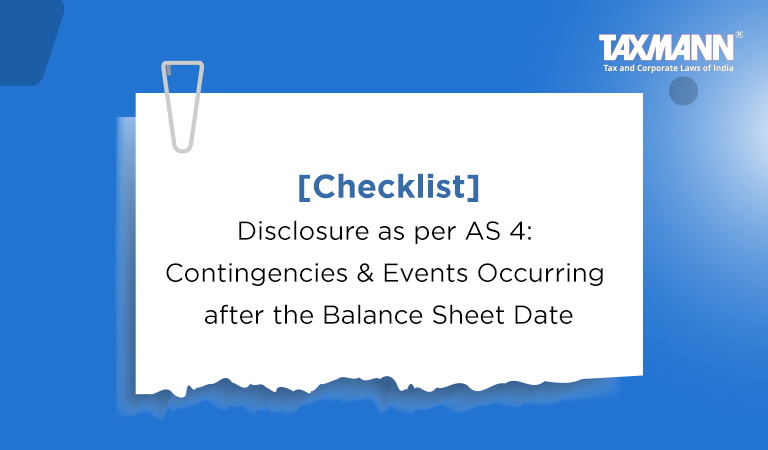[Checklist] Disclosure as per AS 4: Contingencies & Events Occurring after the Balance Sheet Date
- Blog|News|Account & Audit|
- 2 Min Read
- By Taxmann
- |
- Last Updated on 9 January, 2023

AS 4: Contingencies and Events Occurring After the Balance Sheet Date, deals with the treatment in financial statements of contingencies, and events occurring after the balance sheet date. However, contingencies due to subjects like (a) liabilities of life assurance and general insurance enterprises arising from policies issued; (b) obligations under retirement benefit plans; and (c) commitments arising from long-term lease contracts are excluded from the scope of this standard.
As per the requirement of this standard, an entity is required to follow the below-mentioned disclosure requirements:
I. If it is difficult to estimate the amount of contingent loss due to conflicting or insufficient evidence, whether the disclosure about the existence and nature of contingency has been made?
II. Where contingent liability is matched by a related counter-claim or claim against a third party, a potential loss to an enterprise may be reduced or avoided. The amount of the provision in such cases is determined after considering the probable recovery under the claim. In such case whether nature and the gross amount of the contingent liability has been disclosed?
III. If an enterprise has undertaken any discounted bills of exchange or similar obligations, has the entity disclosed the existence and amount of guarantees, and obligations arising from the same by the way of note, even though the possibility that a loss to the enterprise will occur is remote?
IV. If either of the following conditions are not met, whether the existence of a contingent loss is disclosed in the financial statements, unless the possibility of a loss is remote:
(a) it is probable that future events will confirm that, after taking into account any related probable recovery, an asset has been impaired or a liability has been incurred as of the balance sheet date, and
(b) a reasonable estimate of the amount of the resulting loss can be made.
Click Here To Read The Full Story
Disclaimer: The content/information published on the website is only for general information of the user and shall not be construed as legal advice. While the Taxmann has exercised reasonable efforts to ensure the veracity of information/content published, Taxmann shall be under no liability in any manner whatsoever for incorrect information, if any.

Taxmann Publications has a dedicated in-house Research & Editorial Team. This team consists of a team of Chartered Accountants, Company Secretaries, and Lawyers. This team works under the guidance and supervision of editor-in-chief Mr Rakesh Bhargava.
The Research and Editorial Team is responsible for developing reliable and accurate content for the readers. The team follows the six-sigma approach to achieve the benchmark of zero error in its publications and research platforms. The team ensures that the following publication guidelines are thoroughly followed while developing the content:
- The statutory material is obtained only from the authorized and reliable sources
- All the latest developments in the judicial and legislative fields are covered
- Prepare the analytical write-ups on current, controversial, and important issues to help the readers to understand the concept and its implications
- Every content published by Taxmann is complete, accurate and lucid
- All evidence-based statements are supported with proper reference to Section, Circular No., Notification No. or citations
- The golden rules of grammar, style and consistency are thoroughly followed
- Font and size that’s easy to read and remain consistent across all imprint and digital publications are applied



 CA | CS | CMA
CA | CS | CMA
